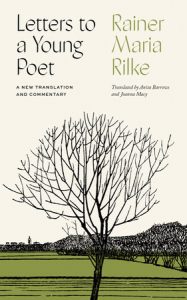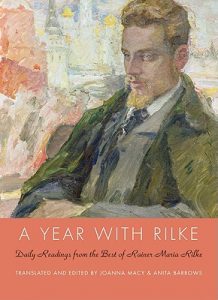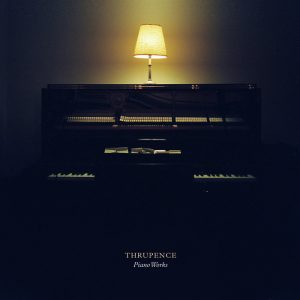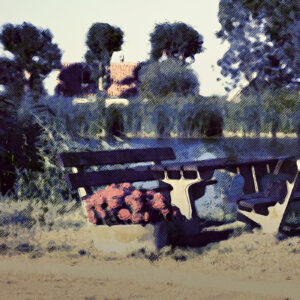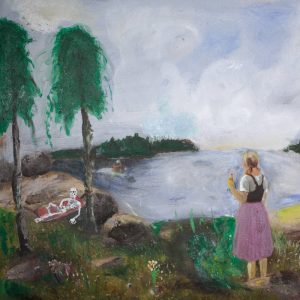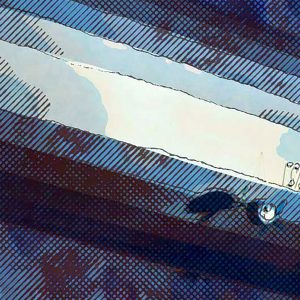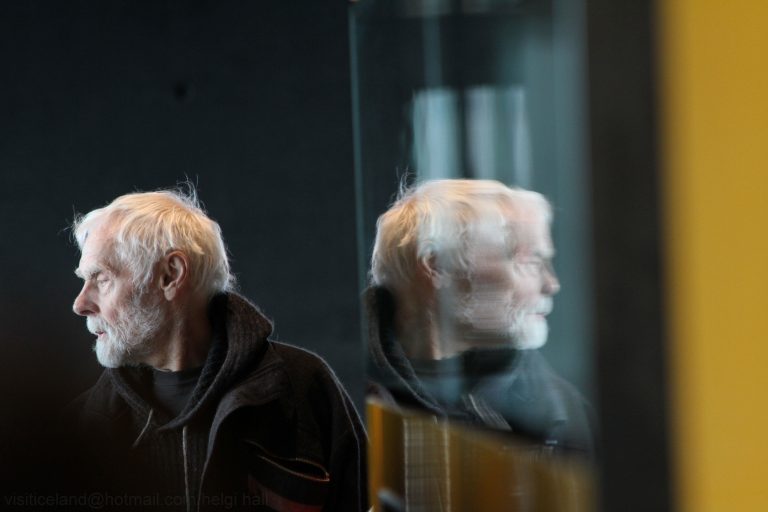Joanna Macy and Anita Barrows
‘What a world you’ve got inside you.’
A new translation of Rainer Maria Rilke’s Letters to a Young Poet has been released in a world in which his voice and vision feel as resonant as ever before. In ten letters to a young person in 1903, Rilke touched on the enduring dramas of creating our lives — prophetic musings about solitude and relationship, humanity and the natural world, even gender and human wholeness. And what a joy it is to delve into Rilke’s voice, freshly rendered, with the translators. Krista, Anita and Joanna have communed with Rainer Maria Rilke across time and space and their conversation is infused with friendship as much as ideas.
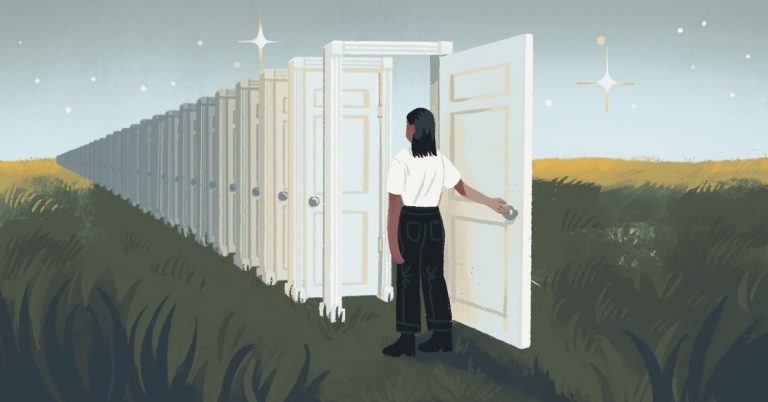
Image by Lily Qian, © All Rights Reserved.
Guests
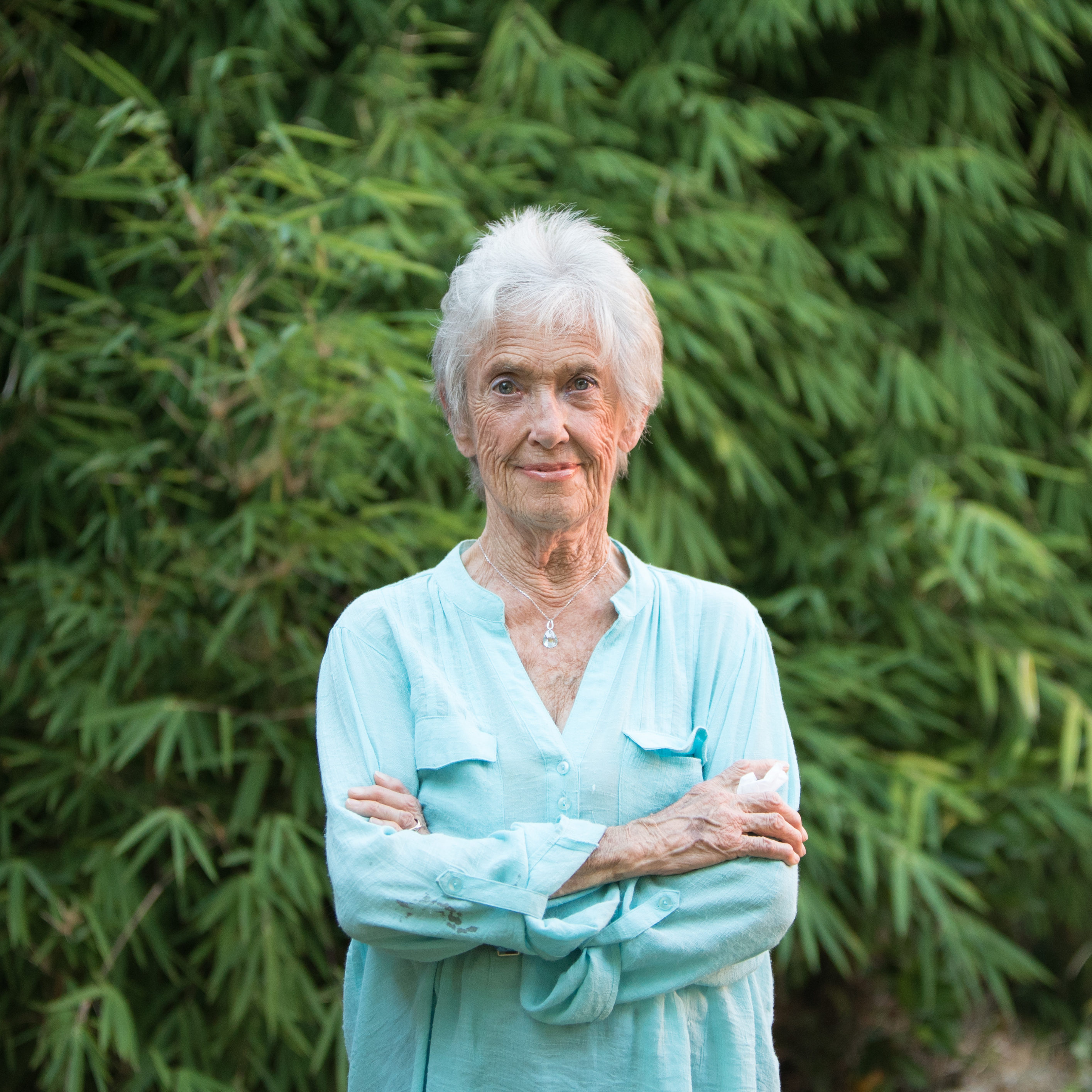
Joanna Macy is a philosopher of ecology and Buddhist teacher, and the root teacher of The Work That Reconnects. She’s the author of many books. Our previous On Being episode with her is “A Wild Love for the World.” That’s also the title of a lovely book of homage to her published in 2020.
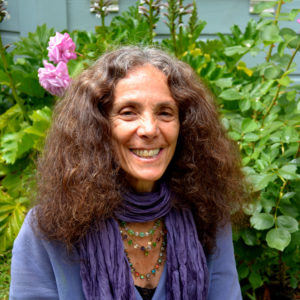
Anita Barrows has translated three books of Rilke’s writing with Joanna, in addition to Letters to a Young Poet, Rilke’s Book of Hours: Love Poems to God, In Praise of Mortality, and A Year with Rilke. Anita is a psychologist and poet. She was a voice in the On Being episode, “The Soul in Depression.” Her most recent poetry collection is Testimony.
Transcript
Krista Tippett, host: If you have listened to On Being for any period of time, you have probably heard me invoke Rainer Maria Rilke. His works of prose and poetry are enduringly beloved — the Sonnets to Orpheus; the Duino Elegies; the Book of Hours. But none of his words have carried more persistently across time than his Letters to a Young Poet. It’s a small volume of ten letters Rilke wrote between 1903 and 1908 to a young military cadet and would-be poet, named Franz Kappus. Kappus reached out to Rilke, full of anguish about life, about love, about adulthood. But Rilke’s way of addressing these questions from an ordinary life touched on the enduring dramas of creating our lives — prophetic musings about solitude and relationship, humanity and the natural world, even gender and human wholeness.
And now, for us, there is a new translation. What a joy it is to delve into Rilke’s voice freshly rendered, with the translators, themselves prophetic humans: the wise psychologist and poet Anita Barrows and the incomparable Buddhist philosopher of ecology, Joanna Macy.
Joanna Macy: In his letter that he wrote — he wrote an amazing letter, Rilke did, from Sweden. And he starts out saying, “I’ve been thinking.” He’s not responding so much to the cadet, but he’s speaking about: there’s something going to happen. It is enormous. It is huge. “We must accept our reality in all its immensity. Everything, even the unheard of, must be possible within it. This is, in the end, the only courage required of us: the courage to meet what is strangest and most awesome.”
[music: “Seven League Boots” by Zoë Keating]
Tippett: I’m Krista Tippett, and this is On Being.
[music: “Seven League Boots” by Zoë Keating]
The conversation that follows is infused with friendship as much as ideas. Joanna and Anita have translated Rilke together across decades, alongside many other professional and life adventures. I’ve come into friendship with both of them as guests on this show — Anita on “The Soul in Depression,” Joanna on her spiritual and activist “Wild Love for the World” — and all three of us have communed with Rainer Maria Rilke across time and space. The Bohemian Austro-Hungarian world into which he was born in 1875 was utterly remade by the tumult of the young 20th century. Amidst the tumult of our young century, I spoke to Anita Barrows and Joanna Macy via Zoom.
Well, I wish I were sitting in a room with the two of you. [laughs] But here we are.
Joanna Macy: Can I see you?
Tippett: No, you can’t see me. You’re just going to hear me. I’m like the voice of God coming straight into your thoughts …
[laughter]
… and you into mine.
Anita Barrows: I’m not even going to look at my screen. I’m going to look at the redwood tree in front of my house.
Macy: That’s a good idea.
Tippett: This is a little hard to get used to, but I mean, I sometimes close my eyes, so I can completely listen. And it’s such a joy to be with the two of you. And I can’t really tell you how excited I was when I heard that you were translating Letters to a Young Poet, which — I feel like this book has — it’s been part of my life for such a long time, since — I think, Joanna, one thing you and I have in common is those — the early years we spent in Berlin, or in Germany. And we were both there in chapters of its 20th-century tumult, which was kind of a fault line of the world’s 20th-century tumult.
And I have my book with me. I think the two of you have your books with you. And I really just want us to kind of talk about this book and read to each other. And you know, I was just amazed, recently — I’m not sure I knew this or had ever taken it in — to read — well, it’s in your book, too, but I had read it recently somewhere else, that Rilke himself was only 27 when he replied to these letters. [laughs]
Barrows: That’s right. And I did not take that in at all, when I read it. I assumed he was an elderly man. [laughs]
Tippett: Yes, yes.
Macy: Well, he never got to be elderly.
Barrows: Right. Right.
Tippett: No. No.
There seems to me something that I have identified with in the last period that wasn’t there for me when Rilke entered my life, which was in the last couple of decades of the last century, is that he was a turn-of-century person, just as we have become turn-of-century people. It feels like there’s something in the heft of what he said and how he said it that he, also, in 1903 when he was writing those letters, was on the cusp of this unimaginable tumult and carnage and transformation of that last century.
Macy: Yes. You know, in the Book of Hours, which we’re not talking about, but he then, just a couple of years younger than when he is writing to the military cadet in his letters to this young poet, he said, “The leaf is turning like a century is entering,” just at that moment, at the becoming of the 20th century. And you could feel his — what would you say? — his awe and a troubled sense: what is in store? And the fates that are turning this page to the 20th century look at each other and say nothing. And he senses — he could’ve known nothing about the two world wars, the death camps, the nuclear bombs, the — [laughs] none of that. And yet, he sensed that to his core.
Barrows: Yes, very much, and he was very aware of the dangers of industrialization, which were already beginning to have their effect, certainly on Europe. And I think that was a piece of it — that there was an ominous sense of what was happening to the natural world which he loved.
Tippett: And all of that, everything that you two have just mentioned, is with us still and again, right?
Barrows: Yes. Yes, exactly. Exactly.
Tippett: That’s what I kind of — I feel, emanating from these pages, from these words.
It does seem to me — I have to say, in the last week, just in the last week, I have had his language of living — his language of living the questions has become absolutely central to my work and to my life. And just in the last week, for example, I’ve had it quoted at me by a neuroscientist and by a television actor. [laughs] And it does feel to me like if there is — and so let’s just maybe start with living the questions. Let me just read that passage, very particularly that experience of standing before great personal and civilizational questions, which right now have no answers. [laughs]
So he said — and which letter was this? This was Letter 4.
Barrows: It’s the fourth, yeah.
Tippett: “I ask you, dear sir, to have patience with all that is unresolved in your heart and to try to love the questions themselves, like closed rooms, like books written in a foreign language. Don’t try to find the answers now. They cannot be given anyway, because you would not be able to live them. For everything is to be lived. Live the questions now. Perhaps you then may gradually, without noticing, one day in the future live into the answers.”
Macy: What a wonderful way to relate to uncertainty.
Barrows: Yes, yes. And I think, you know, so much, especially in our very consumer-oriented society, where we’re looking for answers all the time, we’re looking for solutions — rapid solutions and neat solutions — [laughs] here we are, being told to live into the questions, to be able then to say, “I don’t know. I have to sit with this. I have to be with it.” It’s a practice that we’re not taught by anything in our society.
Macy: But it’s the only way to be in the present moment, because when we want to know, “Oh, where’s this heading? Are we heading to war? Are we heading to — can I have it now? Shall I be — can’t I have hope?” All of those things, even the question of hope takes you out of the present moment. And the present moment is the only place you’re really present, the only place where you can actually choose.
Tippett: You know, I have actually really taken this teaching as a life practice of holding the questions, loving the questions, and of — I’ve taken it as a life practice, with a question — to actually very actively do that: put the question before me, hold it, treasure it, nurture it, walk with it. And I have found that if you are faithful to a question like this, it will be faithful back, right? It will do this thing that he says, which is that you live your way into whatever the form an answer takes.
Macy: Yes! Then it comes toward you. Then it has more to say to you. Then you can hear it. And it — then you have a capacity. You are with the question in a way that invites you to become something that you haven’t been, yet. It extends a hand. So this is what I have been feeling even more in this last year or so, with all the work with Rilke’s feeling in him — this sense of opening to the reciprocity of life. It’s a living world. We can listen to it. We can open to it. It’s not a machine that we poke and press and push a button. It’s a mystery. And we meet the mystery, and then it talks.
[music: “Orchard Lime” by Blue Dot Sessions]
Tippett: I’m Krista Tippett, and this is On Being — today, delving into Rainer Maria Rilke’s Letters to a Young Poet with Joanna Macy and Anita Barrows. They’ve just released a fresh new translation of that work.
[music: “Orchard Lime” by Blue Dot Sessions]
Joanna, I say, so living the questions is perhaps the part of the book that I feel — I’ve watched people culturally discover, so many people discover or have it be part of their life. I have also always felt, and never more than recently, that the things that Rilke said about gender 100 years ago, in this book — that our world has met him there now.
Macy: Or almost.
[laughter]
I think that we still have a lot to learn. I think he’s a little bit beyond us, at the moment.
Tippett: Well, let me just — like there’s one part, also in that fourth letter, where he says, “Perhaps the genders are more closely related than people think. The great renewal of the world will perhaps consist in this: that male and female, freed from all false feelings and disinclinations, do not seek each other as objects, but rather as siblings and neighbors, to become human together, simply, seriously, and patiently helping each other bear the burden that sexuality has placed on them.”
[laughter]
Barrows: Isn’t that wonderful?
Tippett: Well, it — to me, it’s a description of — of where we are — as you say, fitfully, imperfectly, but I think heading as a culture. But then, of course, there’s the extraordinary part in the letter from Rome, Letter 7, where he talks about “the girl and the woman.” I don’t know — does one of you want to read some of that?
Barrows: Yes, sure.
Tippett: Page 59 — 59, 60 is where I’m looking.
Barrows: Oh yes, oh, that’s wonderful. Yes.
Tippett: Or maybe “One day the girl and the woman who don’t define themselves …” Whatever you’d like to read, as much as you’d like to read, there.
Barrows: Let’s see. I’m looking for exactly — oh, here we go. “One day, the girl and the woman who don’t define themselves in masculine terms but as something in themselves, female humans, will require no other completion. This enormous shift will transform the character of love, which is hampered today by the resistance of men, and generate a relationship from human to human, not from man to woman. And this more human love, endlessly considerate and light and good and clear, consummated by holding close and letting go, will resemble that love that we so arduously prepare — the love that consists of two solitudes that protect, border, and greet each other.”
Macy: Ah.
Barrows: Yeah, I love that passage. [laughs]
Macy: Yeah. Yeah.
Barrows: Yeah — “two solitudes that protect, border, and greet each other.” Yes, so it’s not the merging, not the convention-bound ways of acting.
And I love that Rilke speaks — I mean, I could see where it could be critiqued, but I love that he speaks, at the beginning of that paragraph, about the ways in which women need to be careful of not just stepping into the patriarchal system, the patriarchal values, which, you know, has happened to a large degree. We’ve had the feminist movement, but in many ways we have not yet brought the feminine sufficiently into our culture. And the feminine — I think Rilke — you know, [laughs] Rilke was talking about this so early on, at the beginning of the last century.
Macy: He was also concerned that in the freeing of coming to experience and being free to experience one’s sexuality, it was male sexuality. So much of what — how sexual freedom in our country, and even sexual fulfillment, has come to be identified with what he calls here the “lust and thrust and restlessness.”
[laughter]
Tippett: I don’t think that was in the Herter Norton translation.
Barrows: No. [laughs] Right. Right. We had a good time translating that.
Tippett: [laughs] And what we’re talking about is the feminine aspect to humanity, right?
Barrows: Yes, exactly.
Tippett: This is not just about women. It’s about a fullness of human nature and human capacities.
Barrows: Yes. Yes, exactly. Exactly.
Tippett: I’m just curious, and Joanna, you’ve lived such a long time, you’re so amazing — I wonder how you see, again — well, so we should clarify that Franz Kappus was writing to Rilke, as this lovesick young person, right? So he was bringing sexuality into these letters. But Rilke did always reply to that in — well, he replied in a very tender, personal way, but also in the whole context of relationships — of gender, really, that certainly 100 years ago was so much of a box and a container and compartment. Joanna, I’m especially curious about how you’ve watched this evolution.
Macy: Well, I’m remembering — yeah. I’m thinking of the love between Rilke and Lou — Lou Andreas-Salomé, when he was 21 and she was 35, and they met. And it was just a totally powerful experience that outgrew the sexual part, at least from her point of view, but they stayed best friends. And she took him walking barefoot through the fields at dawn, [laughs] in the foothills of the alpine meadows along the Isar, near where we used to live, and that he adapted so quickly to this natural singing of the Earth itself, in his bones. And he combined it also with the simplicity of the — sort of the Russian peasant that he acquired when he went with her to Russia. And singing the Earth became — he could feel that.
What a shift from in his late teens and 20, 21, becoming such a dandy, and to let himself open to the natural world so widely, so fully, and let that shift what love of man and woman or love for anything felt like — was. The freedom in that, and then even what that could mean for politics. And that gave him a trust in life that I sense in him, in his words, in his poetry. Life comes toward him to meet and be met. It rings in his lines. And it reaches me, and standing here, a hundred-and-what …
Barrows: Almost 120, yeah.
Macy: … when we cannot be sure or even have the trust that complex life forms will endure beyond the next few decades. We’re seeing a huge shattering of life itself. And yet, having been with Rilke, his trust in life is still with me. And so I trust being with life, even though life — the web of life might crumble, but then I’m still with it. I’ll be with it anyway, even in the crumbling. The song is so deep in him.
[music: “Ballet” by Thrupence]
Tippett: After a short break, more with Joanna Macy, Anita Barrows, and Rainer Maria Rilke.
[music: “Ballet” by Thrupence]
I’m Krista Tippett, and this is On Being. Today, as a new rendering of Rainer Maria Rilke’s Letters to a Young Poet is released in a world in which his voice and vision feel as resonant as ever before, we are delving into that work with the translators. Joanna Macy is a philosopher of ecology and Buddhist teacher. Anita Barrows is a psychologist and poet. They are the closest of friends, and former guests on this show. They’ve previously created splendid translations of three other books of Rilke’s writing. Rilke sent his ten prophetic letters about life and love to a young, lovesick military cadet and would-be poet, between 1903 and 1908.
So let’s talk about solitude for Rilke, which was also so defining, so permeated his poetry, his life, his writing. It’s so interesting to be speaking about solitude right now, in the post-2020 world, where, civilizationally, we went through — almost the global “we,” although with huge variation in terms of the experience — but of social isolation, right? And I wonder, I’m curious about this world that we move into beyond that — at least the parts of the world that are emerging from the worst of the pandemic. Do people start to reckon or work with or play with solitude in a new way? And what would Rilke have to say to that?
Macy: Well, I’m so struck by how members even in my own family, my own children, my own grandchildren, how the pandemic and the lockdowns and the care of has resulted, for so many of them, of more time out-of-doors in the natural world, in direct contact, even if it’s when it’s their backyard or walking in the park, and giving them a habit of this that they do not want to give up, and that the solitude becomes — as it was for Rilke — not being by yourself, but by being in, with, surrounded by, and of the living natural world; that you’re surrounded by the rustle and touch and reach and murmur of the natural world.
Barrows: Yeah. And I think that was really something Joanna and I discussed throughout the process of doing this translation, because there are moments in the letters where Rilke seems to idealize solitude at the cost of community, at the cost of some belonging to the collective. And we were at moments irritated by that, because —
Tippett: Yes — he also seems to emphasize it at the cost of probably being a good partner [laughs] to the woman he’s with.
Barrows: Exactly. Oh my God, yes. [laughs] Right. Right. Right.
Tippett: Sorry, go on.
Barrows: Yeah, no, we kind of got fed up with it, at moments. [laughs]
[laughter]
Macy: Yeah, we worried about if the young cadet were to take him seriously. You know, you have to be — if you’re forbidden to write poetry, if you’re forbidden to write, then you’re not a — you must be ready to die for your …
Barrows: [laughs] Right. Right.
Tippett: You know, here — I’m going to read a little bit from — this is page 56. This is from Letter 7. You know, I have to say, this is a passage that was so important to me in my 20s, and really life-giving. I mean, this is to me a robust definition of solitude that is about —about making and defending that home within oneself.
So he says, “Don’t let your solitude obscure the presence of something within it that wants to emerge. Precisely this presence will help your solitude expand. People are drawn to the easy and to the easiest side of the easy. But it is clear that we must hold ourselves to the difficult, as it is true for everything alive. Everything in nature grows and defends itself in its own way and against all opposition, straining from within and at any price, to become distinctively itself. It is good to be solitary, because solitude is difficult, and that a thing is difficult must be even more of a reason for us to undertake it.”
And then he says, “To love is good, too, for love is difficult. For one person to care for another, that is perhaps the most difficult thing required of us, the utmost and final test, the work for which all other work is but a preparation. With our whole being, with all the strength we have gathered, we must learn to love. This learning is ever a committed and enduring process.” So he’s always — even as he is defending solitude so fiercely and, as you say, sometimes extremely, it always moves back and forth with the notion of loving.
Barrows: Yes, yes, exactly. And he really emphasizes the need to love from that place of solitude — that love is not about merging, but it’s about being oneself fully, and from that place of fullness …
Macy: Yes, I love that.
Barrows: … being able to meet the other. Yes. Yes.
Macy: Right here he says, “For love is not about merging. It’s a noble calling for the individual to ripen, to differentiate, to become a world in oneself in response to another.” I love that.
Tippett: It’s so interesting, you know, I remember being so moved by that and it being so helpful to me in those young years, when I was tempted — I mean, you know, because he’s really saying to Franz Kappus, to his young correspondent, “Become yourself, before you join with another human being.”
And — but I say, also, that language, after my marriage ended, after my divorce, I read it again and realized how wise it was, right? I mean, it’s incredible wisdom.
Barrows: Yes, I know — I felt the same, after my divorce. And I thought, all right, the love I have for my children, the love I have for my friends, that love also needs to come from that place of wholeness.
Tippett: Joanna, I’m curious about that phrase for you and that notion for you.
Macy: Well, just when I was sitting here, I was remembering — because our first conversation was shortly after my husband died, after a marriage of 56 years. And I remember, about a year before we married, I’d been talking away, talking away as he was driving, and then he just looked at me and he said, “What a world you’ve got inside you.” And then I knew that it was my own world, and he could tell. He didn’t want to own it, he didn’t want it to be explained, but he was so glad it was there.
All of that was in his voice. And that stayed with me throughout all those five-and-a-half decades — a world in myself. And being a stranger to each other, to some extent, we always affirmed that. And Rilke helps us there.
Tippett: And in your memoir, Joanna, you wrote about your long marriage. And it was an adventure, right? And it had — it had hard parts in it, it had parts in which that — the fact of being strangers was defining. And yet you kept finding your way back to each other.
Macy: That’s right. That’s right. It was always interesting.
[laughter]
Always interesting. [laughs] Yeah, never finished. Never finished.
[music: “Donnlee” by Blue Dot Sessions]
Tippett: I’m Krista Tippett, and this is On Being, today delving into Rainer Maria Rilke’s Letters to a Young Poet with Joanna Macy and Anita Barrows. They’ve just released a fresh new translation of that work.
[music: “Donnalee” by Blue Dot Sessions]
Macy: Well, speaking of growing and seeing with expectations and not knowing, did you catch the part in these when he talks about “You haven’t lost God” — because, you know, the cadet, Franz Pappus, was a complainer. You could tell that.
[laughter]
And so he complained that he’d lost God. And so [laughs] because — and he’d believed in God as a child, and now he didn’t anymore. And then he even complained about that. And so — remember? And he has this great idea. He says, “Just think” — where do I have that …
Barrows: Page 51.
Macy: I just — it tickles me. [laughs]
Tippett: Would you like to read that?
Macy: Yeah, he says, “Do you think that anyone who really has Him” — God — “could lose Him, like a little stone? Don’t you think that one who holds Him” — God — “could only be lost by Him? Why not think, rather, that He is the one who is coming, moving toward us from all Eternity, the final fruit of a tree whose leaves we are? What stops you from projecting God’s birth into times to come and from living your life like a painful and beautiful day in the story of an immense pregnancy? Don’t you see how everything that happens is ever again a new beginning? And couldn’t it be His beginning? For to begin, in itself, is already so beautiful. If God is the fulfillment, must not what is lesser come before him so that he can emerge from fullness and overflow? Must he not come last, in order to include everything in Himself? And what meaning could we find, if God for whom we yearn belongs to the past?”
Tippett: And then that next sentence — “As bees gather honey, so do we reap the sweetness from everything and build God.”
Barrows: Yes. [laughs] Yes, it’s wonderful.
Tippett: So Joanna, talk to me about — tell me what’s in that, for you.
Macy: Oh, so much. So much. I’m — it’s inside me. I’m 92 now. I am in this tenth decade of my life, when I follow with rapt attention what is happening with the climate catastrophe, with the mass extinctions of our siblings in the creation of this world. I feel that there is within me a sense that, read through Rilke, the translations, and also very much through the work that I have been blessed enough to do, called The Work That Reconnects, and that starts the spiral journey that it is, with gratitude — so much gratitude — that what’s in it is that we are never abandoned. But there is something for us to behold and be part of and that — and to be there. The great moment is there for us, to be present to this incredible moment. We’ve got to realize — we will realize that we belong to each other. That’s coming forward now. How could we not harvest that understanding in this moment?
Tippett: And you know, Joanna, if somebody had, let’s say, just tuned in in the last ten minutes and listened to you speak about God, they would not guess that you are an eminent Buddhist teacher. What does that language of God — what does that mean for you? How do we talk about what that is and how that itself has been evolving?
Macy: Because God has become a word for everything, so we reach for something that includes everything. I’m looking in his letter that he wrote — he wrote an amazing letter, Rilke did, from Sweden. And he starts out saying, “I’ve been thinking.” He’s not responding so much to the cadet, but he’s speaking about: if you could take in, there’s something going to happen. It is enormous. It is huge. “We must accept our reality in all its immensity.”
So you need God language for that if you’re in the West, and then, of course, I was born into a theistic, a Christian tradition, so it’s in — and I come from [laughs] a long line of preachers, so it’s in my bones. “We must accept our reality in all its immensity. Everything, even the unheard of, must be possible within it. This is, in the end, the only courage required of us: the courage to meet what is strangest and most awesome.”
Tippett: You know, I’m curious about — you’ve talked about this as a time in which we are faced with the “great unraveling” or the “great turning,” or perhaps both of those at the same time. Just with this conversation holding us, with Rilke by our side, what do you see right now?
Macy: Well, it seems clear that we who are alive now are here for something and witnessing something for our planet that has not happened at any time before. And so we who are alive now and who are called to — who feel called, those of us who feel called to love our world — to love our world has been at the core of every faith tradition, to be grateful for it, to teach ourselves how to see beauty, how to treasure it, how to celebrate, how — if it must disappear, if there’s dying — how to be grateful. Every funeral, every memorial service is one where you give thanks for the beauty of that life or the quality of what — and so there’s a need, some of us feel — I know I do — to what looks like it must disappear, to say, “Thanks, you were beautiful. Thank you, mountains. Thank you, rivers.”
And we’re learning, how do you say goodbye to what is sacred and holy? And that goodbye has got to be — has got to be in deep thanksgiving for having been here, for being part of it. I kind of sound like I’m crying, and I do cry, but I cry from gladness, you know. I’m so glad to recognize each other. You can look in each other’s face, see how beautiful we are. It’s not too late to see that. We don’t want to die not knowing how beautiful this is.
Tippett: You know, when I think about Rilke and the ways he brings together solitude and love, I feel like you also have always have brought together what I would think of as synonyms or companions to those, like interior life and aliveness. I’ve heard you talk about the voice within and that if people can hear the voice within, they hear that the voice within wants to live. And when people can share that voice within, they fall in love with the world, they fall in love with each other, they fall in love all over again with life.
Anita, you have spoken about your calling as a psychologist and a teacher, and also as a translator and writer, as standing at the intersection of the sacred, the daily, and a holding of the pain of the world. So I just want to ask you the question I asked Joanna a minute ago — what do you see, looking out right now, and again, with Rilke as our friend standing alongside us at that intersection?
Barrows: I think about the passage that I referred to before, from the Ninth Duino Elegy, where Rilke really speaks about what he sees as our mission as human beings. “Perhaps we are here to say …” — and then he names things about the world. So for me — I actually just had a book of poems published, called Testimony, which is 20 long poems and a coda. And each of the poems speaks about some of the suffering of the world — I speak about a prisoner, I speak about a child in Syria, I speak about a checkpoint in the West Bank, occupied Palestine — speaks about the suffering of the world, and then I move in other sections of the poems to the beauty of the world. And for me, that intersection of suffering and beauty, gratitude, as Joanna says, feels like my mission in poetry.
And to state that, to name that, to be here to name those things feels essential to me, and I see Rilke as my friend in that. This conversation is so wonderful, because it’s really bringing me back to the origins of my reading Rilke, who really was the first serious poet whose work I read when I was first feeling my own vocation as a poet — that he was so engaged with this as our mission, perhaps we are here to say. And if you have the passage, Joanna?
Macy: Yes, I have it, and I remember when we translated that together. This is the ending of the Ninth Duino Elegy. An elegy is an incantation or a poem at the end of a funeral.
“Earth, isn’t this what you want? To arise in us, invisible?
Is it not your dream, to enter us so wholly
there’s nothing left outside us to see?
What, if not transformation,
is your deepest purpose? Earth, my love,
I want it too. Believe me,
no more of your springtimes are needed
to win me over—even one flower
is more than enough. Before I was named
I belonged to you. I seek no other law
than yours, and know I can trust
the death you will bring.
“See, I live. On what?
Childhood and future are equally present.
Sheer abundance of being
floods my heart.”
Tippett: Ohhh.
Macy: Thank you, Rilke.
Barrows: Yes, thank you, Rilke. Thank you for accompanying us.
Macy: Thank you for being with us.
[music: “Klockan” by Andreas Söderström & Rickard Jäverling]
Tippett: Joanna Macy is the root teacher of The Work That Reconnects. Our previous episode with her is “A Wild Love for the World.” That’s also the title of a lovely book of homage to her, published in 2020. Anita Barrows was part of the On Being episode on “The Soul in Depression.” And both of those shows include readings from Rilke’s poetry that they’ve translated together so brilliantly: Rilke’s Book of Hours: Love Poems to God; also, In Praise of Mortality and A Year with Rilke. Anita Barrows’ most recent poetry collection is Testimony. She is Institute Professor of Psychology at the Wright Institute in Berkeley, California, and also maintains a private practice. And Anita and Joanna’s Letters to a Young Poet: A New Translation and Commentary was published in June, 2021.
[music: “Vittoro” by Blue Dot Sessions]
The On Being Project is: Chris Heagle, Lily Percy, Laurén Drommerhausen, Erin Colasacco, Eddie Gonzalez, Lilian Vo, Lucas Johnson, Suzette Burley, Zack Rose, Colleen Scheck, Julie Siple, Gretchen Honnold, Jhaleh Akhavan, Pádraig Ó Tuama, Ben Katt, Gautam Srikishan, and Lillie Benowitz.
The On Being Project is located on Dakota land. Our lovely theme music is provided and composed by Zoë Keating. And the last voice that you hear singing at the end of our show is Cameron Kinghorn.
On Being is an independent, nonprofit production of The On Being Project. It is distributed to public radio stations by WNYC Studios. I created this show at American Public Media.
Our funding partners include:
The Fetzer Institute, helping to build the spiritual foundation for a loving world. Find them at fetzer.org.
Kalliopeia Foundation, dedicated to reconnecting ecology, culture, and spirituality, supporting organizations and initiatives that uphold a sacred relationship with life on Earth. Learn more at kalliopeia.org.
The Osprey Foundation, a catalyst for empowered, healthy, and fulfilled lives.
The Lilly Endowment, an Indianapolis-based, private family foundation dedicated to its founders’ interests in religion, community development, and education.
And the Ford Foundation, working to strengthen democratic values, reduce poverty and injustice, promote international cooperation, and advance human achievement worldwide.
Books & Music
Recommended Reading
The On Being Project is an affiliate partner of Bookshop.org and Amazon.com. Any earnings we receive through these affiliate partnerships go into directly supporting The On Being Project.





